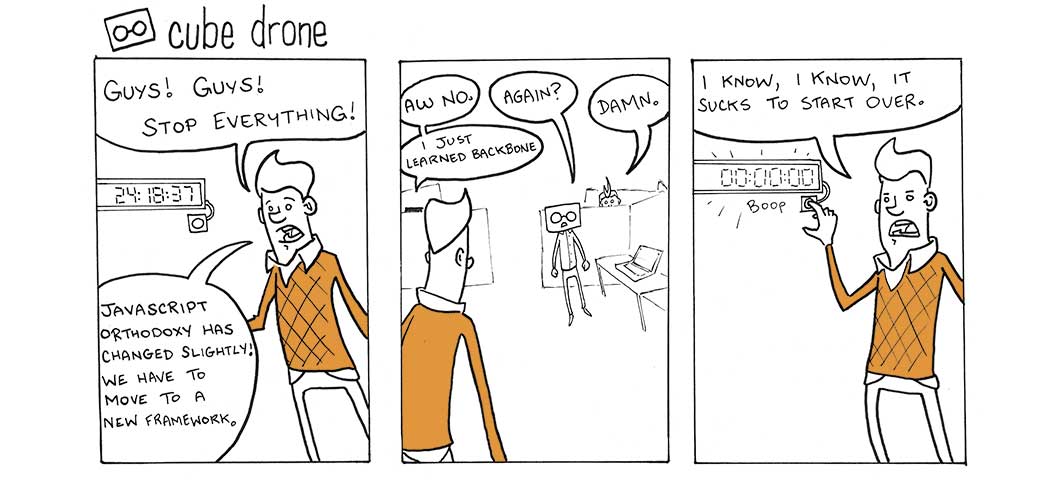What I've learned from Learning how to learn
What I've learned from "Learning how to learn"
This 4 week course on coursera, is the solution I found on the Internet about my learning problems. As a software developer I know that our ability to learn new technologies, skills are vital in our careers.
Every day a new technology, a new buzzword arises, and we are unable to catch the stream day by day. This leads to frustration, but at the end it leads to refusing to learn or conceiving new ideas altogether.

For example read this blog post about Javascript Fatigue
My first solution to this problem was learning the theory behind the technologies, not the technology itself. This directed me to the roots of the software development, paradigms and models (which I wrote about on my blog in Turkish, too)
Second solution was this blog itself. Writing about something you wanted to learn makes you think about on every aspects of the topic, makes you disciplined for following the sub-topics and deepens your knowledge.
This approach did a great job at the beginning when I have the enthusiasm and lots of free time (I had broken my leg and stayed at home for four and a half months). Vast amount of topics I needed to learn started to accumulated again. I can see 4 articles waiting to be finished in my drafts queue and I'm starting a new one (yeah I'm whimsical on topics) already.
The last solution was this course, and I wanted to learn quickly (or easy) as possible, so I attended Learning How To Learn.
I hope there is a how to teach course, too. I can probably learn to teach by understanding how I learned myself.
The Course
This course is prepared by Dr. Barbara Oakley and Dr. Terrence Sejnowski. They are one of the best researchers on learning, memory and the brain generally.
And this is the general course's contents, and my interpretations:
What Is Learning

Working Memory and Long Term Memory
It is important to get to know brain and memory and how they work. This is a nerdy blog so I will jump to computer term analogies:

Working memory is the RAM of your laptop. RAM is the memory of the computer that CPU directly works on. If CPU needs other data apart from the RAM data, it reads from a hard disk and loads to the RAM.
Long term memory is the hard disk of the computer. It is much bigger than your RAM, but it is slower and needs to be transferred to the RAM to be processed by CPU.
Apart from the analogy, we can say that working memory is a fast but limited power of the brain. So we need to use it efficiently (like not letting something to distract us from our focused mode). And if we need to remember and learn the topic permanently, we need to transfer the information to our long term memory.
Focused versus Diffuse Thinking

Our brains have two main modes of thinking; focused and diffused. Focus mode is the one when you are concentrated on the topic and gaining information. But there is a drawback here; you sometimes can't see other solutions or aspects when you're in focused.
Analogy: When you are looking through a microscope, you can see the germs very clear and detailed, but probably won't see your near surroundings (for example rats in the room!).
Diffuse mode on the other hand, is a more relaxed mode of thinking of your brain, which can access broader parts of your brain and memory. Connections between different knowledges of your previous learnings (called chunks in the course) happens in this mode.
This mode is activated when you're sleeping, doing activities, shower, cleaning etc.
To be able to learn efficiently, we have to use our brains by switching between these two modes sequentially. There is even a technique called the Pomodoro technique.
Procrastination, Memory, and Sleep
Procrastination is the delaying activity when you encounter with a difficult task like doing your homework or project, and then you choose to look at facebook, twitter instead 😈. This is a very bad habit that if you are constantly doing this, you will absolutely fail in the end although you fool yourself with cat videos 😼.
 The Pomodoro technique also helps you to solve the procrastination problem, by simply making your working and learning activities planned and focused on the process NOT the product.
The Pomodoro technique also helps you to solve the procrastination problem, by simply making your working and learning activities planned and focused on the process NOT the product.
Our long term memory thrives with repetition and practice. Doing all the learning in a day doesn't help the long term memory. Instead we should consistently learn bit by bit throughout in a long period.
Analogy: Brain muscles are like our regular muscles. We need time, sleep and lots of practice to develop muscles.
Also see this youtube video about why do we need to sleep. Just don't fell asleep, read the rest of the article!
Beside these techniques here my thoughts about preventing procrastination:
- Try to look at the big picture firstly
- Write about it on your own words
- Prepare a list of sub-topics and related topics
- Recursively look at those topics
- Find ways to use what you learned.
- Repeat this cycle with the spaced repetition
Chunking
Basically, what people do to enhance their knowledge and gain expertise is to gradually build the number of chunks in their mind: valuable bits of information that they can piece together in new and creative ways.

Chunks are neurones bound together through use and often meaning. Chunking is gaining these chunks; bits of informations related together. This happens in the focused mode of your brain. Once you get enough of chunks, you'll get the bigger picture better. But knowing the big picture while you're learning helps improving your chunking ability, too.
Analogy: Chunking is a down to top, getting big picture is a top to down learning methods. So if we do them together we will be learned the topic in the middle; both near to the chunks and the big picture.
To achieve gaining lots of chunks, one must practice intently and regularly by using the focus mode. Recalling and testing yourself with what you've learned is the best method for grasping and strengthening knowledge into the long term memory.
Also, chunks can help you understand new concepts. This is because when you grasp one chunk, you will find that that chunk can be related to similar chunks not only in that field, but also in a very different field. This is also called transfering.
Analogy: Chunks are the pieces of a puzzle. Puzzle is the big picture.
Seeing the Bigger Picture

If you have lots of chunks on that topic, it is easier to get the bigger picture. Gaining as many chunks as possible while thinking about its place on the big picture helps learning much. Also chunks can be knit together and create bigger chunks that once triggered you can accomplish a complex activity without using working memory.
It's quite common to get stuck on a problem often because you have initial ideas about what the solution should be that block your ability to see the real solution. It is called Einstellung.
Einstellung could be the source of the problem on work that when you have a new idea people often criticise and reject without trying or even thinking about it.
Interleaving is practicing by different concepts, approaches and techniques all in one session. This helps you to be flexible and master the material.
This also effects Einstellung problem and helps you to look from other angles.
Brain storms and collaborative thinking can be a method of interleaving by scaling people.
Notes to the Self
Learning new ideas is the essence of my career, maybe the living itself. Before learning a new idea, we should think about the learning itself. Knowing the good techniques and keeping away the bad habits can increase efficiency, and I believe this must be the principal skill to be developed. I regret I didn't find the course before, but I'm happy I get it and hope to see results in the future.
From now on I need to practice what I've learned from this course. This is the most challenging part of Learning how to learn. Because I need to observe my methods constantly and change my old habits.
I have turn off my phone's notifications when working in focused mode, or sleep well and exercise often, but I'm not doing them. I know I need to change my habits and probably it needs time.

Using Pomodoro technique can help me achieve my goals so I found a simple open source tool called Tomighty. I'm also keeping a todo list on Trello.
I also want to use the recall technique. I plan to use this technique whenever I'm encountering a different concept other than the one I'm dealing that time. For example on work, I'm talking to a colleague about a problem and then she mentions another module of the software we're developing. I need to recall that module and tell myself what is that module doing in a single sentence.
This technique could be disruptive but I will try and will use if it is successful.
About a month ago, I started to use an app called memrise. This application helps you to learn new languages and other topics by using the scientific methods: learning a few words daily and reviewing them constantly that it wouldn't be forgotten.

I always wanted to learn Japanese, so I started on it. Now I know the Katakana and Hiragana writing systems (to read). And I learned about 270 words and basic sentences.
Analogy: Memrise is also using the analogy technique: When you learn a new word, think of it as planting a new seed in your memory. Then every time you review that memory you help it to grow a little bit - like watering a little flower. By reviewing at the right time you help it grow as fast as possible. Soon you’ll have a glorious garden full of flower-memories.
I also wanted to increase my English vocabulary, and learned 300 new words so far. Even I found a Shell Scripting course and learned 84 new shell commands. This is my profile if you want to follow me 😁
There is one more technique I wanted to look at. I had heard it from The Mentalist and Sherlock shows. You can learn it briefly about it on the course as well. But TV shows interpret it much more exciting 😄
Sherlock:
The Mentalist:
Summarize
After I wrote this article, I finished my last test on the course as well. I shouldn't do it by that time (midnight). Because toxic substances accumulates on your brain thoughout the day and they will be cleared when you are sleeping. So I took the test at the worst time, fortunately I passed 😅
I hope you enjoyed this reading and get something from my experiences and thoughts. I wanted to know about your thoughts, corrections and additions. You can add a comment below if you want.